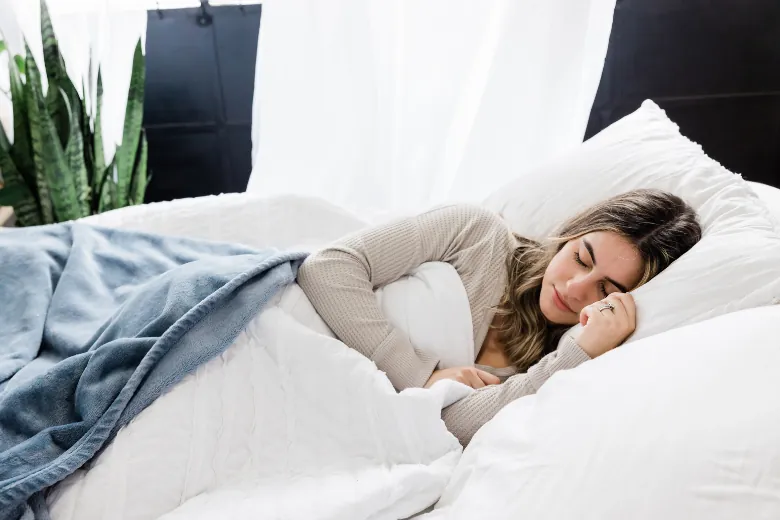Creating Your Ideal Sleep Routine
Do you find yourself tired and groggy when you wake up, even if you got a full night's rest? Are your nights filled with tossing and turning, checking the clock every hour on the hour as your mind runs amok? It doesn't have to be this way - creating an ideal sleep routine can help boost your mood and alertness level throughout the day. In this blog post, we will look at how to set up a routine that works for YOU to get a better night's sleep. So grab your favorite journal (or whatever tool helps you stay organized), and let's explore some of the ways that women can create their ideal sleep routine!
Determine the number of hours you need to get a good night's sleep
Getting a good night's sleep is essential to keep your body and mind healthy. Many of us struggle with insomnia or poor sleeping habits, which leads to unrestful rest. The amount of sleep one needs will vary between individuals, but it's generally recommended that adults get between seven and nine hours of shuteye each night to function at their peak. Some people may need more or less than that depending on things like age, lifestyle, physical activity levels, and time spent on electronic devices. If you feel like you're not getting enough quality sleep, it's worth taking the time to assess and improve your sleeping routine - ultimately giving yourself the best chance for productive days ahead!
Establish a bedtime and stick to it as much as possible
Bedtime is a really important part of a healthy lifestyle, and establishing one you can adhere to regularly is essential. By instituting a sensible bedtime and sticking with it, you're allowing your body to rest, recharge, and be prepared for what lies ahead the next day. Setting a consistent routine will help regulate your body's internal clock, allowing for more restful sleep, which in turn results in increased energy and productivity throughout daily tasks. Best of all, taking steps to prioritize your shut-eye can also help provide an improved sense of well-being overall. Establishing a bedtime is easy — so why not take control of your sleep schedule today?
Avoid watching TV or using electronic devices in bed
It may be tempting to curl up with your electronic devices in bed, but it's important to remember why you should avoid doing this if possible. Watching TV or looking at a screen of any kind late at night can cause an increase in cortisol levels, which is linked to anxiety and depression. A screen also blocks out the natural light emitted by daylight, which is needed for your brain to trigger key hormones such as melatonin. Missing out on that crucial interaction with sunlight can have a severe effect on your sleep cycle and your energy levels for the following day. Instead of reaching for the remote or laptop, try reading a book before going to bed—it not only has positive effects like reducing stress, but it's a great way to wind down after a long day.
- Advertisement -
Reserve the bedroom for sleep and sex - keep other activities out of the room
Knowing how to use the bedroom properly can help create a healthier, more enjoyable home environment. So, if possible, try to stick to the rule of reserving the bedroom for sleep and sex only; avoid activities like working, eating, and watching TV in there. Yes, it can be tempting to get comfy on the bed with your laptop after a long day, but this could cause you to associate the bedroom with stress rather than relaxation. Keeping screens out of this room is also important as some studies show that exposure to light from electronic devices can interfere with getting quality sleep - this includes phones too! Make sure that when you enter your bedroom all you want is peaceful rest or intimate time with your partner for a much better bedtime experience.
Create a relaxing bedtime routine, such as reading or taking a bath
Winding down after a full day can be a struggle - but creating a calming nighttime routine to look forward to can make it easier. Reading before bed is one simple thing that can be done to create an atmosphere of peace and relaxation. The same goes for taking a bath! Adding Epsom salts or essential oils may bring an extra element of serenity to the ritual. In both cases, the goal is to cultivate a tranquil environment before getting some much-needed rest for the night. Setting aside some time for yourself to switch your mindset from 'go mode' to 'relax mode' is key to establishing healthy sleep habits.
Reduce noise and light exposure in the bedroom
If you're looking for a sleep experience that's restorative and dreamy, it's important to optimize your bedroom to make sure you're maximizing the lack of noise and light exposure. Using blackout shades or curtains can go a long way in cutting down on unwanted light from windows, street lamps, or other sources. You can also try using earplugs if the sound is an issue. Adding a sound machine with rainforest or ocean sounds can either help drown out any external noises or provide white noise for a better night's rest. Make your bedroom tailored to you and see how much better quality of sleep you'll attain with these simple steps!
Depending on your sleep habits, you may need anywhere from 7 to 9 hours of sleep each night. To ensure that you're getting the rest you need, establish a regular bedtime and stick to it as much as possible. You should also avoid watching TV or using electronic devices in bed, reserve the bedroom for sleep and sex, create a relaxing bedtime routine, reduce noise and light exposure in the bedroom, and make sure your sleeping environment is comfortable. By following these tips, you can help improve your sleep quality and quantity.



